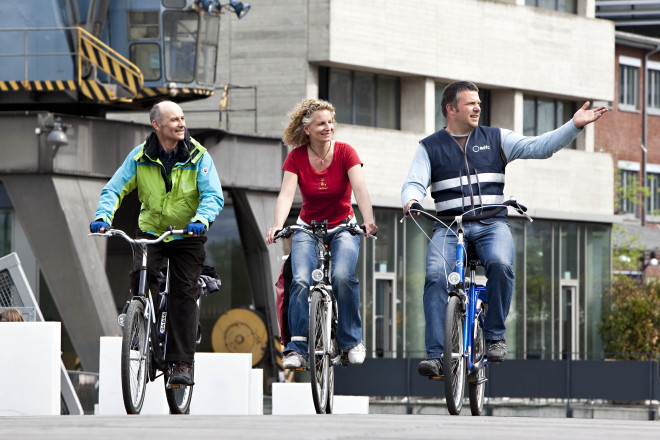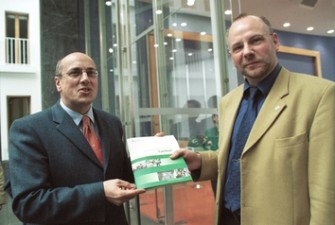
Member of the Month – For 34 Years, German ADFC Has Shown That Cycling Advocacy Works
It's Germany's turn in our Member of the Month series. With Eurobike starting next week and Angela Merkel in attendance, here's the story about how German ADFC has managed to get cycling on politicians' agendas for over 34 years.
Burkhard Stork is not easily impressed. Nor could he be as the executive director of one of the largest and most influential cycling advocacy organizations in the world with over 140.000 members. But on 28 August 2013, even the CEO of German ADFC (Allgemeiner Deutscher Fahrrad-Club) will be more than a little nervous. That day, Angela Merkel will open Eurobike, Europe’s biggest bicycle trade show, becoming the first German chancellor to do so.
 Before “Angie” agreed to come and speak to the cycling community, ADFC had a long way to go, though. Founded in 1979 in Bremen by traffic engineer Jan Tebbe, ADFC was born at a time when the car-friendly city had almost become an unchallenged dogma in the German public and among German politicians. “It almost seemed like a crazy idea to start a cycling lobby at the time,” Burkhard Stork says.
Before “Angie” agreed to come and speak to the cycling community, ADFC had a long way to go, though. Founded in 1979 in Bremen by traffic engineer Jan Tebbe, ADFC was born at a time when the car-friendly city had almost become an unchallenged dogma in the German public and among German politicians. “It almost seemed like a crazy idea to start a cycling lobby at the time,” Burkhard Stork says.
But over time, ADFC indeed managed to become the cycling equivalent of the ADAC (Allgemeiner Deutscher Automobil-Club), the all-powerful German car drivers’ federation. With the stated aim to replace as many “Autos” with a “Fahrrad”, Jan Tebbe had seemingly struck a nerve. 10 years after its foundation, the ADFC already had 60.000 members.
Cycling advocacy: the road to success
The roaring success of ADFC had mainly one reason, Burkhard Stork says. “The ADFC has been a success story because we are efficient cycling advocates. During all 34 years of our existence, we were able to convince politicians to implement more cycling-friendly policies,” Stork explains.
Prominent members helped as well. Johannes Rau, former president of the Federal Republic, was a long-time member, for instance. “He opened many doors for us,” Burkhard Stork recalls.
As a consequence, ADFC can look back at a long list of advocacy successes. Two of the most remarkable achievements came in 1997 and 2002. First, the German Bundestag agreed on a new traffic law giving more rights to cyclists, abolishing mandatory use of many cycle paths, among many other changes. Five years later, the federal government adopted the first ten-year German national cycling plan. It has just been replaced with an even more ambitious plan until 2020, the high point in ADFC’s history as a cycling lobby so far.
Such successes could not have been possible without excellent contacts to the policy makers in Berlin and on the local level. “We are organizing parliamentary evenings that Members of the Bundestag regularly attend to get informed about cycling policies, for instance,” Burkhard Stork says. “And the federal government relies on our expertise in order to implement the national cycling plan.”
A solid base and big plans for the future
ADFC has sections in all 16 federal states and offices in more than 100 municipalities - a solid base for successful cycling advocacy on the regional and city level. Not to mention its membership of ECF, an organization that ADFC helped to build up in a leading role, and which gets German cyclists access to the highest level of EU decision-makers.
When he’s sitting in the audience listening to Angela Merkel, then, Burkhard Stork can tick another box on the list of ADFC’s successes. But to tell from the history of the federation, he’s not going to stop there. “We at least want to double the modal share of cycling in Germany to 15 percent until 2020,” he boldly declares.
Unsurprisingly, politicians in Berlin already got the memo. ADFC has just published its position paper for the German federal elections in September, to make sure cycling remains on top of their agenda.
About the Author
 Karsten Marhold works as Communications Assistant at the European Cyclists’ Federation. He has a masters degree in European history and cultures and is a researcher in European Integration in Brussels. His interests focus on cycling as a sustainable form of mobility and the corresponding EU policies.
Karsten Marhold works as Communications Assistant at the European Cyclists’ Federation. He has a masters degree in European history and cultures and is a researcher in European Integration in Brussels. His interests focus on cycling as a sustainable form of mobility and the corresponding EU policies.
- Log in to post comments
Contact the author
Recent news!
Upcoming events
Contact Us
Avenue des Arts, 7-8
Postal address: Rue de la Charité, 22
1210 Brussels, Belgium











